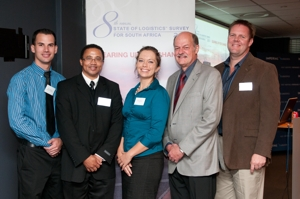Release of 8th State of Logistics survey
Amidst change and uncertainty in global economies, a shift is seen towards emerging markets that have been more resilient to the economic downturn than their counterparts in developed countries. South Africa is currently well positioned to shine as a global business partner, with the performance of its logistics sector being a key determinant.
"This resonates with the theme of South Africa's 8th State of Logistics survey, namely `Gearing up for Change'. The survey was released today (23 May 2012) by the Council for Scientific and Industrial Research (CSIR), IMPERIAL Logistics and Stellenbosch University.
"The South African government's increased focus on and investment in infrastructure development have seen more than R260 billion being set aside for transport and logistics projects." says Dr Cornelius Ruiters, Executive Director of CSIR Built Environment. "The effective maintenance, expansion and management of our country's infrastructure will enable South Africa to compete at a higher level globally," Ruiters notes.
"For logistics to become a competitive weapon for South Africa, change is required. We need to change from the mindset that logistics is merely the result of other market activity, to that of giving logistics its due as a value creator," emphasises Cobus Rossouw, Chief Integration Officer of IMPERIAL Logistics. "South Africa is a leader in complex, emerging and dynamic logistics environments and has achieved success despite geographical impediments, severe skills shortages and lack of economies of scale,"
International standing
"This survey is one of only a handful of studies worldwide that quantify logistics costs using a modelling approach. The South African State of Logistics survey is recognised nationally and abroad as a premier reference for macro-level logistics trends in South Africa," explains the scientific editor and project coordinator of the 8th State of Logistics survey, Nadia Viljoen of the CSIR. "This edition provides an inside look into the research models, metrics and methodologies used to generate results. Comparing the reports published over the past eight years, one can track trends of a number of important logistics factors within the country. Known for its rigorous, independent and in-depth quantitative analyses, the survey is valuable to government decision makers and industry strategists in the logistics arena."
Some issues highlighted in the 8th edition of the survey include:
Transport costs
Transport costs are the single greatest factor impacting on South Africa's logistics costs, comprising 53.2% of the logistics bill. South Africa is a 'transport-hungry' economy; if transport is not given priority as a strategic planning imperative, it could become the Achilles heel of economic growth. Research by Stellenbosch University confirms that transport costs showed a drastic increase of 16.2% during 2010, compared to 2009, while inventory carrying costs decreased by 19.9% during the same period. These changes are due to fuel prices hikes and greatly reduced interest rates, respectively.
Road versus rail
The shift required from transporting cargo by road to rail remains a concern. Dr Jan Havenga and Zane Simpson of Stellenbosch University have identified the uncertainty and risk relating to the fuel price as an important risk for South Africa's transport costs. Simpson states, "A solution to mitigating the risk associated with transport costs is a significant modal shift from road to rail, but consideration should also be given to reducing transport demand."
Port access to markets
Maritime connectivity is a strategic issue, with not only volumes of cargo being important, but enhanced access being key. South Africa ranks 30th out of 162 coastal countries. It is in the same league as Brazil and India, and outperforms coastal SADC countries by far in terms of maritime connectivity. This is according to the United Nations Conference on Trade and Development. In addition, the Georgia Institute of Technology found that Durban and Mauritius are far better globally connected than other ports in SADC, with Durban being on par with the ports of Mumbai and Rio de Janeiro.
Crop revenue loss
A case study measured the range of vibrations that fruit cargo undergoes when being transported from growers in Limpopo on gravel, provincial and national roads to Pretoria and Johannesburg. Small-scale farmers are more vulnerable to fruit cargo damage - they often do not have insurance and cannot absorb losses as easily as larger concerns.
A second case study found an incremental loss of income due to wheat-loss when transported on bad as opposed to good roads. The wheat-loss due to vibrations is estimated to amount to R2.5 million per year for South Africa.

Presenters at the launch of South Africa's 8th State of Logistics survey: Zane Simpson (Stellenbosch University); Dr Cornelius Ruiters (Executive Director: CSIR Built Environment); Nadia Viljoen (scientific editor of the survey, CSIR); Hans Ittmann (HWI Consulting); and Cobus Rossouw (IMPERIAL Logistics).
"The South African logistics sector must proactively gear up for change. Uncertainties facing the local sector should be tackled head-on to maintain our reputation as a strong, emerging logistics performer despite massive challenges," concludes the CSIR's Nadia Viljoen.
The Full report on the 8th State of Logistics survey is available at www.csir.co.za/sol
For any enquiries regarding the 8th State of Logistics survey you can contact Nadia Viljoen, CSIR, scientific editor and project leader of the 8th State of Logistics survey: nviljoen@csir.co.za
Stellenbosch University - Dr Jan Havenga and Zane Simpson, Centre for Supply Chain Management: email janh@sun.ac.za and zane@sun.ac.za